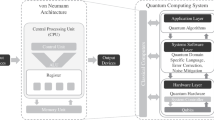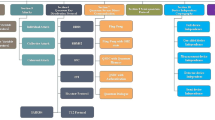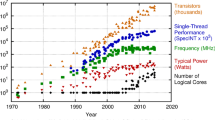Abstract
In classical computation, a “write-only memory” (WOM) is little more than an oxymoron, and the addition of WOM to a (deterministic or probabilistic) classical computer brings no advantage. We prove that quantum computers that are augmented with WOM can solve problems that neither a classical computer with WOM nor a quantum computer without WOM can solve, when all other resource bounds are equal. We focus on realtime quantum finite automata, and examine the increase in their power effected by the addition of WOMs with different access modes and capacities. Some problems that are unsolvable by two-way probabilistic Turing machines using sublogarithmic amounts of read/write memory are shown to be solvable by these enhanced automata.

Similar content being viewed by others
Notes
The QTM model is appropriate for studying the effect of space bounds on computational power. See Yao (1993) for an alternative model of quantum computation.
Unlike Watrous (1998), we also allow efficiently computable irrational numbers as transition amplitudes in our QTM’s. This simplifies the description of some algorithms in the remainder of this paper.
The reader may find it useful to consult the descriptions of the common notational items in the discussion, given immediately after the introduction.
Note that each transition of \({\mathcal{M}}\) in Eq. 1 writes a symbol determined by the source state of the corresponding transition of \({\mathcal{D}}\) to the register. This ensures the orthonormality condition for quantum machines described earlier.
This idea has been adapted from an algorithm by Kondacs and Watrous for a different type of quantum automaton, whose analysis can be found in Kondacs and Watrous (1997).
RT-N1BCAs can also recognize \(L_{center} = \{ ubv \mid u,v \in \{a,b\}^{*},|u|=|v| \},\) and the languages studied in (Freivalds et al. 2010), none of which can be recognized by RT-QFAs with unbounded error.
References
Aharonov D, Kitaev A, Nisan N (1998) Quantum circuits with mixed states. In: STOC’98: proceedings of the thirtieth annual ACM symposium on theory of computing, pp 20–30
Alt H, Geffert V, Mehlhorn K (1992) A lower bound for the nondeterministic space complexity of context-free recognition. Inf Process Lett 42(1):25–27
Ambainis A, Yakaryılmaz A (2011) Automata and quantum computing. In: Automata: from mathematics to applications (in preparation)
Arora S, Barak B (2009) Computational complexity: a modern approach. Cambridge University Press, Cambridge
Blondel VD, Jeandel E, Koiran P, Portier N (2005) Decidable and undecidable problems about quantum automata. SIAM J Comput 34(6):1464–1473.
Bonner R, Freivalds R, Kravtsev M (2001) Quantum versus probabilistic one-way finite automata with counter. In: SOFSEM 2007: theory and practice of computer science. Lecture notes in computer science, vol 2234, pp 181–190
Bozapalidis S (2003) Extending stochastic and quantum functions. Theory Comput Syst 36(2):183–197
Chan T (1981) Reversal complexity of counter machines. In: STOC’81: proceedings of the thirteenth annual ACM symposium on theory of computing, pp 146–157
Ciamarra MP (2001) Quantum reversibility and a new model of quantum automaton. In: FCT’01: proceedings of the 13th international symposium on fundamentals of computation theory. Springer-Verlag, pp 376–379
Freivalds R (1979) Fast probabilistic algorithms. In: Mathematical foundations of computer science 1979. Lecture notes in computer science, vol 74, pp 57–69
Freivalds R, Karpinski M (1994) Lower space bounds for randomized computation. In: ICALP’94: Proceedings of the 21st international colloquium on automata, languages and programming, pp 580–592
Freivalds R, Winter A (2001) Quantum finite state transducers. In: SOFSEM 2001: theory and practice of informatics, pp 233–242
Freivalds R, Yakaryılmaz A, Say ACC (2010) A new family of nonstochastic languages. Inf Process Lett 110(10):410–413
Hirvensalo M (2008) Various aspects of finite quantum automata. In: DLT’08: proceedings of the 12th international conference on developments in language theory, pp 21–33
Jeandel E (2007) Topological automata. Theory Comput Syst 40(4):397–407
Kondacs A, Watrous J (1997) On the power of quantum finite state automata. In: FOCS’97: proceedings of the 38th annual symposium on foundations of computer science, pp 66–75
Kravtsev M (1999) Quantum finite one-counter automata. In: SOFSEM’99: theory and practice of computer science. Lecture notes in computer science, vol 1725, pp 431–440
Li L, Qiu D (2008) Determining the equivalence for one-way quantum finite automata. Theor Comput Sci 403(1):42–51
Moore C, Crutchfield JP (2000) Quantum automata and quantum grammars. Theor Comput Sci 237(1–2):275–306
Nasu M, Honda N (1971) A context-free language which is not acceptable by a probabilistic automaton. Inf Control 18(3):233–236
Nielsen MA, Chuang IL (2000) Quantum computation and quantum information. Cambridge University Press, Cambridge
Paschen K (2000) Quantum finite automata using ancilla qubits. Technical report. University of Karlsruhe. Available at http://digbib.ubka.uni-karlsruhe.de/volltexte/1452000
Pin J-È (1987) On the language accepted by finite reversible automata. In: ICALP’87: proceedings of the 14th international colloquium, on automata, languages and programming. Springer-Verlag, pp 237–249
Say ACC, Yakaryılmaz A (2010) Quantum function computation using sublogarithmic space. Poster presentation at QIP2010 (arXiv:1009.3124)
Say ACC, Yakaryılmaz A, Yüzsever Ş (2010) Quantum one-way one-counter automata. In: Freivalds R (ed) Randomized and quantum computation. Satellite workshop of MFCS and CSL 2010, pp 25–34
Szepietowski A (1994) Turing machines with sublogarithmic space. Springer-Verlag, New York
Watrous J (1998) Space-bounded quantum computation. PhD thesis, University of Wisconsin-Madison, USA
Watrous J (2003) On the complexity of simulating space-bounded quantum computations. Comput Complex 12(1–2):48–84
Watrous J (2009) Quantum computational complexity. In: Meyers RA (ed) Encyclopedia of complexity and systems science. Springer, New York, pp 7174–7201
Yakaryılmaz A (2011) Classical and quantum computation with small space bounds. PhD thesis, Boğaziçi University (arXiv:1102.0378)
Yakaryılmaz A, Say ACC (2009) Efficient probability amplification in two-way quantum finite automata. Theor Comput Sci 410(20):1932–1941
Yakaryılmaz A, Say ACC (2010) Languages recognized by nondeterministic quantum finite automata. Quantum Inf Comput 10(9, 10):747–770
Yakaryılmaz A, Say ACC (2011) Unbounded-error quantum computation with small space bounds. Inf Comput 209:873–892
Yamasaki T, Kobayashi H, Tokunaga Y, Imai H (2002) One-way probabilistic reversible and quantum one-counter automata. Theor Comput Sci 289(2):963–976
Yamasaki T, Kobayashi H, Imai H (2005) Quantum versus deterministic counter automata. Theor Comput Sci 334(1–3):275–297
Yao AC-C (1993) Quantum circuit complexity. In: SFCS’93: proceedings of the 1993 IEEE 34th annual foundations of computer science, pp 352–361
Acknowledgments
Yakaryılmaz and Say were partially supported by the Scientific and Technological Research Council of Turkey (TÜBİTAK) with grant 108E142. Freivalds and Agadzanyan were partially supported by Grant No. 09.1570 from the Latvian Council of Science and by Project 2009/0216/1DP/1.1.2.1.2/09/IPIA /VIA/004 from the European Social Fund.
Author information
Authors and Affiliations
Corresponding author
Additional information
This paper is an extended version of some of the material in (A. Yakaryılmaz, R. Freivalds, A. C. C. Say, and R. Agadzanyan. Quantum computation with devices whose contents are never read. In Unconventional Computation, volume 6079 of LNCS, pages 164–174, 2010), presented in the 9th International Conference on Unconventional Computation (UC2010).
Rights and permissions
About this article
Cite this article
Yakaryılmaz, A., Freivalds, R., Say, A.C.C. et al. Quantum computation with write-only memory. Nat Comput 11, 81–94 (2012). https://doi.org/10.1007/s11047-011-9270-0
Published:
Issue Date:
DOI: https://doi.org/10.1007/s11047-011-9270-0




